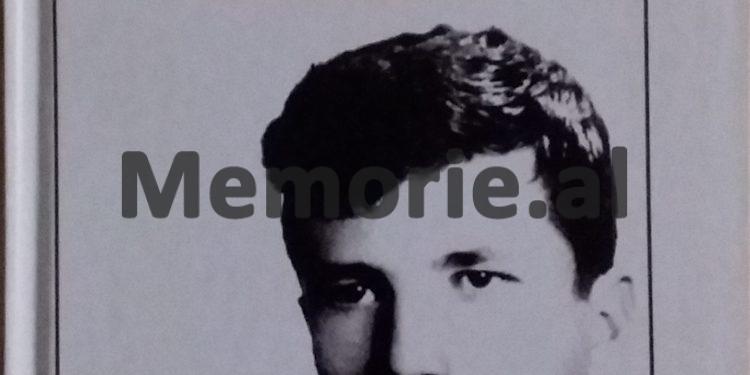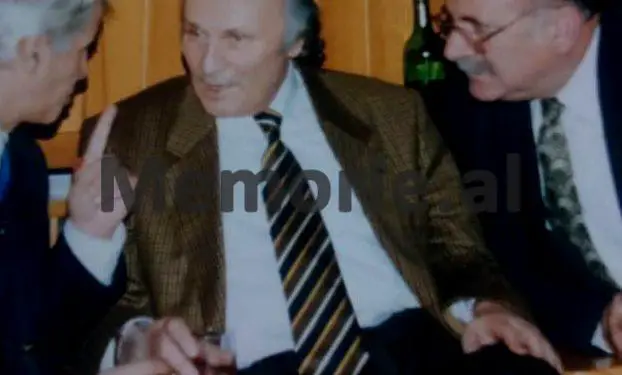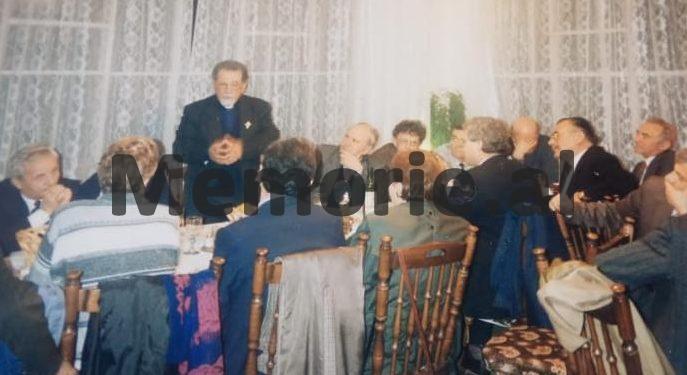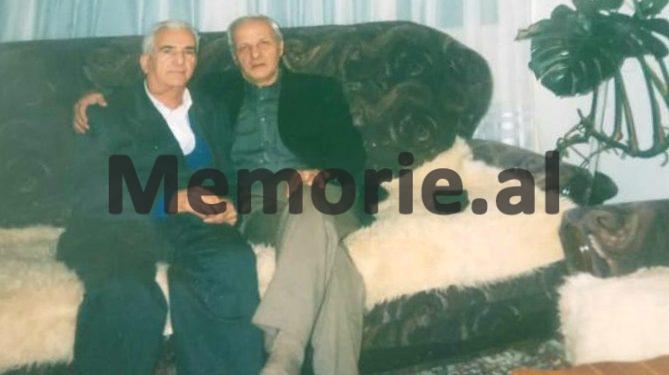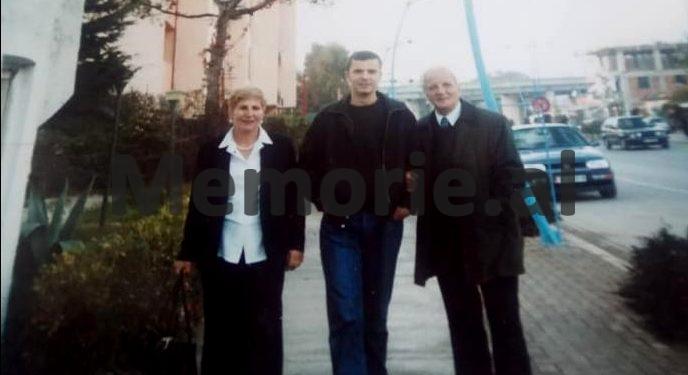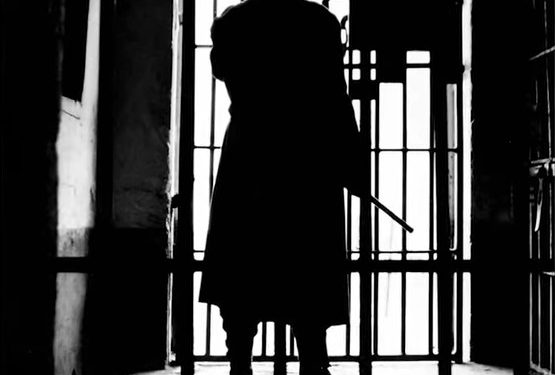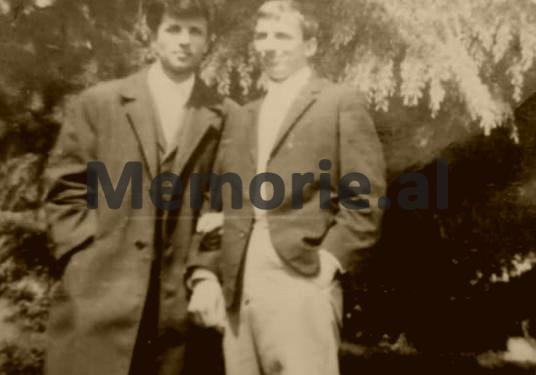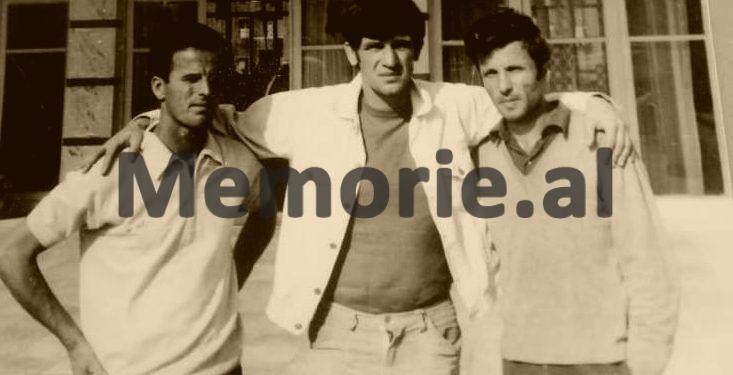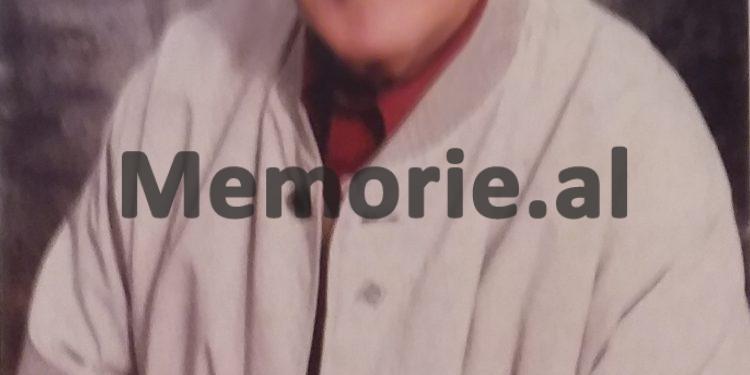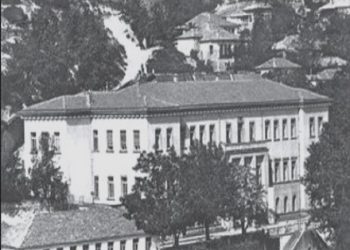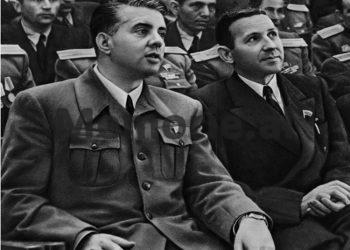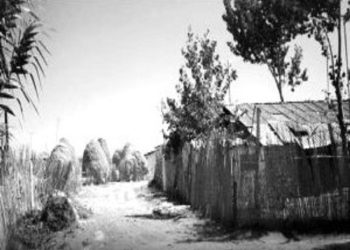Esat Myftari
Memorie.al publishes the unknown story of Esat Myftari, originally from Peja, who was in high school benches when he was a member of a group of young boys who opposed the official Belgrade policy against the discriminatory policy against the Albanian population living in He started working as a journalist for “Rilindja” in Prishtina, from where he was proposed as a correspondent of the TANJUG Agency, but he refused and in 1963 he was forced to flee and come to Albania, with the aim of seeking help and support. from the mother country, for the clandestine organization of the “Boys of Peja”. Matë, where he was arrested in 1975, after he had officially requested repatriation to his homeland Kosovo, sentencing him to ten years in prison on charges of “agitation and prop agenda”, which he suffered in the Spaç camp. The whole painful story of the journalist, publicist, researcher, translator, MP and diplomat, Esat Myftari, is described with a literary mastery in his book, “Your death, my life” an autobiographical novel that has just come out from the Publishing House “Lena Graphic Desing” of Prishtina, and with the permission of the author, will be published in parts by Memorie.al
The unknown story of journalist, publicist and writer Esat Myftari
Esat Myftari was born on June 16, 1940, in the city of Peja in Kosovo, where his family originally came from. He completed his first elementary school education, 7-year-old and high school, in his hometown, completing them in 1959. Also, in 1959, Esat, a 19-year-old boy, began his studies at the Faculty of Law of the University of Belgrade. A lover of history and literature, he started writing at a young age when he was in the 7-year school benches and in the faculty period, he became a member of the Literary Club “Përpjekja” based in the Student City of “New Belgrade” , where he affirms himself quickly and from time to time, writes poems and critical literary views, but due to their content, does not send them for publication.
In 1961, after successfully passing the relevant competition, Esat started working as a journalist in the daily of the province of Kosovo, “Rilindja”, where he is assigned to cover the chronicle of the city of Pristina and the Kosovo Trade Unions. In the same year, he was offered a qualification scholarship at the Yugoslav TANJUG Agency, with the prospect of becoming a correspondent outside the then Yugoslavia. But his joy at the qualifying scholarship that was destined to send him abroad was quickly dashed, as the specialization offered to him was conditional on his membership in the Communist League of Serbia, which 20-year-old Esat refused. categorically.
Meanwhile, in 1963, he participated in a group of young men who disagreed and were against the policy pursued by official Belgrade towards the Kosovo Albanians and wherever they were in their lands under Yugoslavia, and on behalf of the “Peja clandestine group”. , as their representative, crosses the border illegally and comes to Albania. Esat’s goal as a representative of the “Illegal group of boys of Peja”, was to establish contacts with the Albanian state and to seek various support and assistance, for the well-functioning of that group of young boys, which aimed to resist the discriminatory policy of official Belgrade to the Albanian population in Yugoslavia.
In 1974, some members of this group were arrested by the official authorities of the Yugoslav Ministry of Internal Affairs, accused of participating in the events of 1964, when the Albanian national flags were unfurled in the main cities of Kosovo and when they were taken strict police and judicial measures against them. The main motto of this mass movement, which was the first of its kind in post-war Kosovo, was the unification of Albanian lands with their “mother” state, Albania.
Meanwhile, Esati, who was in Albania, as well as some of his Kosovar emigrant compatriots in Albania, gained a right to study and in 1965, he began his studies at the Faculty of Natural Sciences in Tirana, in the “Bio-Chemistry” branch. After the third year of studies, disappointed by the official policy of the communist regime of Enver Hoxha and the treatment of Kosovar emigrants in Albania, who upon their arrival in their homeland, it seemed that “from the rain they had heavy hail”, interrupts his studies and requests repatriation!
Of course, this was not approved by official Tirana and in 1969, Esat started working as a teacher in the 8-year school in the town of Shengjin, in the district of Lezha, where he worked until 1974, from where he was transferred to the village of Tale. of the Mata Coast, where he also worked diligently. As during the whole period, he was working and living in the district of Lezha, Esat was regularly monitored by all means by the State Security organs, even in the school where it was said that he had been sent on purpose, because they were afraid of an escape. his opportunity to go to Yugoslavia from Shengjin, he is arrested and sentenced to 10 years in prison, accused of “agitation and propaganda against the popular power”!
After serving his full sentence while serving his sentence in the Spaç camp, etc. (not benefiting from a single day of reduced sentence), Esat was released from political prison in 1985 and returned to the district of Lezha where he had worked and lived before the sentence and in 1986 , starts working as a worker in the Paper Factory in Lezha. That same year he started a family and then two sons were born.
In 1990, at the beginning of pluralism, Esat took an active part in the popular movements for the overthrow of the communist dictatorship in Albania and with the establishment of the branch of the Democratic Party for the district of Lezha, at the beginning of 1991, for his past and contribution. great at the beginning of those popular protests, he is elected secretary of that branch.
Also, as a result of that contribution, in the first pluralist elections of March 22, 1991, Esat was elected a member of the Democratic Party in the People’s Assembly, representing the voters of the Mata Coast, where he had worked as a teacher until the day of his arrest in 1975.
A year later, in the autumn of 1992, he was appointed Director of the Diaspora Directorate at the Ministry of Foreign Affairs of Albania, headed by the Minister, Alfred Serreqi. In that position, Esat worked diligently until 2000, when he was appointed diplomat at the Albanian Embassy in Riyadh, where he remained until his retirement.
Since that time, Esat has been devoted to his passion, writing, studies and translations and since 2011, he has started publishing several books, which have been welcomed by critics and readers, also because of their subject matter, as well as the variant of Gegërisht that he wrote them, which is very rare in Albanian publications of the mother country!
The first book published by Esat Myftari is “Emrush Myftari” (monograph), and after him come: “Kosovo and Enver Hoxha” (study), “Political profile of Esat Mekuli” (monograph), and “Your death, life ime ”, which is an autobiographical novel, where he has masterfully and chronologically described most of his life, from family and life in Kosovo as a high school student, escape to Albania, many vicissitudes from surveillance of State Security prosecution, arrest, investigation, trial and deportation to Spaç prison.
All the events and everything described in the book “Your death, my life”, are real and the characters there are presented with their concrete names and surnames, while only those people who badly affected his life, (mainly, those of bodies of the Ministry of Internal Affairs of that time, such as operatives, investigators, police officers, heads of the Ministry of Internal Affairs and the Branch of Internal Affairs of Tropoja, Lezha, witnesses in his trial, etc.), the author was has only changed the names, giving them their real surnames.
Continued from the previous issue
Excerpts from the book “Your death, my life”, author, Esat Myftari
Arrest by the Lezha Branch of Internal Affairs
The “jeep” stopped in the yard of the Branch. The chief investigator and the operative came down with some inexplicable haste. The first one quickly disappeared in his office with windows looking out of the street, while the second one called “here”, you shake it towards the back of the building. When his feet trampled the ground and he was trying to steer the body after that grubbing trip, the policeman grabbed him by the arm and ordered him to walk. He was handed over to the perpetrator who was waiting in a standing position to freeze, at the end of the corridor.
– Mark, take it! – said operative Naim Reçi and he immediately got lost in the semi-dark corridor.
They removed the irons. The chief told Ridvan to remove the belt of his trousers and to empty everything he had in his pockets on the table. From there he took out a small arm and a handkerchief, and from his back pocket 1600 old lek, he put in the side of a small brown wallet. It was the amount he had left from his salary.
– Just that? Asked the perpetrator, frowning in astonishment.
“That’s all,” Ridvani replied dryly.
The large plastic box was being filled with the remnants of his civilian life. In fact, they had put it in the car just as they had found it in the workplace: with old dock pants, with a thick square shirt and a thin, hand-knitted sweater. It was beautiful, made of camel hair, which gave a special shade of citizenship and which was remembered by one of the many cousins. Memory from Peja, she had written on a piece of paper, inserted in a sheath.
“Keep it,” said the chief to the sweater, after glancing at all his movements, “and now hear: we know you are a vile man, but when you enter the dungeon you will find another enemy.” of power much more vile than yourself, did you hear ?!
Ridvani did not respond with a voice but with a bitter and sarcastic grin. When the door slammed behind his back and the key rolled in the padlock, Ridvani finally found himself in the dungeon, facing an average-sized person, who was waiting for him on foot and was offering him a friendly grin. His round, almost round face did not reflect any of the stories he had read in the books he saw in the movies about the prisoner in the interrogator.
In the cell with a stranger…!
He reached out and shook his hand vigorously.
– Simon Ziu! – was introduced in a confident voice.
– Ridvan Myftari! – he returned and they looked into each other’s eyes.
When he took his place on the plank bed, covered with two thin, uncluttered ceilings and our smoke, he leaned against the wall. Finally, he had the opportunity to turn his back. She liked the support for the wall and it was like the massage that Rozi occasionally gave her with those thin hands, expressively Nazi and dexterous. And he let out a soft, liberating sigh.
“Welcome,” said Simon, and put his right hand on his heart. – I am from the Coast, he continued, but I have lived for over ten years in Bushat. I am a kind of Albanian synthesis. Where are you from?
– From Kosovo – said Ridvani.
“Oh, from Kosovo,” he shouted, and a slight smile appeared on his face, “you are the first living Kosovar I meet, but I have read and heard a lot about your country.” For political reasons?
– Agitation-propaganda, I think – said Ridvani.
– Not for another?!
– Why, it seems a little?
– Ohh, to us, this crime figure is like that former disease that mainly affected wealthy generosity, which was able to satisfy the whims of the bacillus.
– What about you?
-The accusation against me is serious and humiliating: they call me a monarch-fascist puppet! – he said with a cold automatism and disregard.
– Are you Greek?
He changed the look.
– What a Greek hour, I am a sucker of the great Nika tribe, with early settlement on the Coast, they say even before the Ottoman time and with Mirdita roots. We are a series of different generations that we have given a lot to Albania. But to these, when it is praised, to make a son Venizelos. Understand? He asked, raising his eyebrows.
In the above the door counter was opened. In his square appeared again the face of the chief, who turned his eyes towards Ridvani.
Ask:
– Do you smoke cigarettes?
– Yes.
– How many packages do you want to buy?
– One.
The head muscle moved in the left corner of the mustache.
– How, – he exclaimed, – will I be your courier?! Today one and tomorrow one?! O buy them at once and we will keep them safe, or none!
“Okay,” Ridvan replied, “so as not to disturb you, I will not smoke at all during the investigation.”
The performer opened Gogësu’s eyes:
– Huh! – and slammed the counter in front of him.
When he returned to his place, he saw Simon standing where he was standing with his hands crossed on the harness.
“Ridvan,” he heard his whispering cry, “be careful with the way you respond to these ignorant people, lest they snatch you in the middle for nothing.” Even when you get up to go to the counter, be careful to invent a walk and afflicted view that make them think you are flexible in nature. They have a lot of voice to be held with dignity or with the naturalness of free life. Understand? For these, we are plasticine creatures. And if it were from the North, they would say, “To whom do you sell these bayraktars”?!
Ridvani was trying to open the way for the assembly with him because he touched him at a sensitive point, when the counter was opened again, but now his face appeared big, with hanging rings under his eyes, but he could not determine if these rings came the cause of intense nights or orgies that he was said to spend in secret. It was investigator Gjoleka, the hated of the small northern town, known for his thick jokes.
– Here! – he shouted loudly, accompanied by a kind of chest buzzing.
Ridvani approached.
– I came to tell you that you were indeed sentenced to nine years in absentia in those Yugoslav courts, but we will add one more to them, otherwise we will double it.
To his astonishment, Ridvan returned it somewhat surprised:
– Let’s see what the trial means at the end.
– Hey, – he rumbled our bag, – will happen as I say! We are the ones who decide.
Ridvani was silent.
Conversation in the cell with the chief investigator of the Lezha district
It was his first contact with this roller who carelessly walked over the fate of the people, but who had never heard his cry. The chief investigator had a body of symmetry, with hips protruding like that of a provincial woman who made no attempt at adjustment, but who performed her duties in impenetrable silence. Before being installed here, he quickly had a reputation as a skilled and dangerous investigator sent from the center for complex cases. In Durrës he had comforted some sailors to the Spaç camp, while in Dibër another group of young people for border implications – these areas were especially blessed for conspiracy fantasies – so his arrival in Lezha had made people think that for whom had he come precisely to their city. Lezha was in fact a peaceful and approachable city, wet from the Drini and offering the sea with an almost virgin beach, but which had a big flaw, described as blasphemy: public manifestations, even when a member of the Bureau came , did not accompany them with applause, except for a few apparatchiks who tried to compensate for something with their zeal. And that he had a fantastic corrupting ability: with fish, beef thighs and small gifts accompanied by light humor, he broke the vanguards of the leaders and endowed them with a small round belly like a watermelon ball. But until that moment, Ridvan had not heard of any sensational affair. Six months ago, his closest friend – Prizren hostage – was sentenced to 10 years in prison – but his trial was a parody of even the naivest.
However, when he returned to the country, he had a bad feeling. He was frightened by the instinctive energy of the chief investigator and his conviction of his omnipotence.
The evening came. The darkness outside was thickening – the small window did not give the appearance of a single star, although when it came down from the Jeep it had left the sky clear – so it was impossible to determine what time it was. The accomplice was silent, he was covered for a nap, he even started to make sharp snores with metallic sounds that he had loudly for a while, and the small lamp above the door that emitted the dim light was resembling the evil eye of fairy tales. And yet, like the first night it was, it could not be cursed loudly. After all, he had left out, once and for all, everything that had harassed and disturbed him until yesterday: he would no longer deal with the shadows that floated beyond his window or that were thrown at him as such, he would no longer be we were forced to read to the students the boring texts of the local writers who were glorifying the present, he would not have to provide magazine clippings for the red bucket of the class where he was a caretaker, wash his dishes or go out to the village crown to I washed my body clothes and bed sheets, scrambled eggs with cheese or cottage cheese and accompanied the cornbread with a little brandy, and some garlic cloves, except for the nights when it was decided that Rozi would spend the night with him and he, in instead of garlic, small cinnamon sticks would be attacked as dessert work.
– And you will understand that here’s not drinking water like in those hours of education in Tale. You had found some foolish little girls and some muddy teachers, and here the penny is eaten grain by grain – he said and from his mouth came and a warm spirit of brandy crashed on Ridvan’s face. Now all this would be replaced by prison prefabricated: lukewarm water with a little sugar fried to soften the bitterness, some soup with a few greens or haricot with a few toy grains that refused to be taken prisoner in his spoon, or leaves rotten cabbage in the strong brine. And he would not complain: at night, the new regime of life about which he had heard many stories, justified them all. He begged for sleep and it came to his fingertips, light as a summer breeze, perhaps because he had seen the anxiety of the previous nights, when everything suggested uncertainty. And he laughed when he saw that even the smallest things, those that had not aroused anyone’s interest, not even who knew about them, had been re-dimensioned in his tired and agitated brain.
When the day dawned, he was awakened by a savage call, with a slightly menacing echo. However, Ridvani did not frighten them, he just changed his arm and kicked the two blankets that had been tangled and he was barely separating them.
– Arise! – heard the repeated call of the guard in a stronger tone, and he got up without knowing if he should take a stand ready or he could stay free. He did not need to extend it with this guess, after the guard closed the counter and left with his resounding step. When he heard his call again in the other dungeon, with the same tonality, he realized that he had entered the routine clamp that it was not known how long it would last.
Interrogation by investigators
A couple of hours after breakfast, the door opened and Chief Mark informed him that the investigator was waiting for him. He ordered him to extend his hands forward and with them filled the two spaces of the old irons, remnants of Italian time. It did not tighten much.
– When the hands are tied forward, it is a privilege for the prisoner – said the perpetrator with a light and distant laugh.
Ridvan did not find him, but he looked ahead into the corridor, convinced that he was entering into an unknown and unequal clash.
In the investigator’s room, where a laughing sun had set, Ridvani spotted another person he knew who we had seen, but who had never had the opportunity to learn anything more about him. He was the chief prosecutor of Lezha, one of those creatures that passed through the streets of the city with the heavy shadow of a man who was aware of the many intimacies of the citizens. He was sitting by the window, and the investigator had taken his place around his desk, and from there ordered Ridvan to sit on the bench bolted to the floor. Headed Mark, after removing the irons, with them in hand, left the office.
A short silence fell and we felt it. The investigator seemed to be formulating something to himself, while the chief prosecutor had stretched his legs and stared at the toes of his shoes. It looked like a useless addition to office furniture. Both of these men who were taking over his case were small, extremely brown, like a tandem with secret conspiracies.
– Well, the rabbit fell into the cart – the investigator broke the silence. – Defendant Ridvan Shaqir Myftari, you are charged with Article 73 of the Criminal Code of the RPS of Albania for agitation and propaganda. This accusation is made after the materials collected so far, testify fourfold about your continuous hostile activity. This session is mainly dedicated to your acquaintance with the charge. But for ease of procedure we have thought to make an exception.
As you take a break, take a pile of format paper from the drawer, sharpen two well-sharpened pencils, and place them on the black table top.
– You will receive these letters and, as you are lazy, you will write to us about the process of your ideological and political transformation. We know you came from Yugoslavia as a friend of ours – at least that’s how you presented yourself to us – but here you are.
Why? What were the causes? Or are there deeper motives we do not know? Know that depending on the degree of your sincerity also depends on the gravity of your guilt and the height of the punishment you will receive from our popular court.
The investigator got to his feet and handed him the letters, but Ridvani remained silent and did not move.
– Do you hear? He called.
After that, Ridvani, too, rose to his feet.
– I refused! – he said in a voice not at all hoarse.
– As?
– I did not have any metamorphosis, I am the one who has always been everywhere.
– Like that?!
– Yes.
“Then look at yourself,” said the investigator, “but nothing, we’ll see how you tweet soon.”
– Mr. Investigator, I am not a brave man, but I am not a dwarf either. I here defend my honor and that of my parents! – Ridvani returned.
As he said these words, he himself was astonished at the outburst of his subconscious and did not love himself. At least, he now had no right to refer to his father, because he had come to Albania against his will. Even his boss!
The investigator was stunned, lowered the papers on the table, and pressed the button.
I headed in instantly, almost with kidnapping. It seemed that our time had stood behind the door.
– Take this monkey! He ordered.
But, as he was being put in the dungeon, the perpetrator blew his ear:
– Do not push the mountain with your chest, or you!
Simon greeted him with a questioning look, but did not utter a word. Maybe he was scared of Ridvan’s still grumpy face. And he answered and said unto them, He repented, and was ashamed of the words which he spake in that damn room. His words were still ringing in his ears like a vain, empty, filthy and flea-like emphat. How could he not remember where he was talking to whom?! Those who were right in the shell of human torture. But most of all, he was sorry he had mentioned his father. He realized that he had no right to shake his father’s bones in his unknown and unknown grave, but the bird had already flown. Because his father had always been caring for him, moreover, from an early age, among his six sons, he had singled him out as the hopeful son of old age. Ridvani went and lay down on his wooden stool, left Simon behind, and stared at the gray screen of the wall. His father’s spirit, apparently, could not bear it any longer: he had crossed the walls and borders and was developing on the screen the moment of their separation, the moment of his great deception: The young Ridvan, in a black suit and white shirt borrowed from his older brother, one of the most expensive shirts ever bought in their family and with made shoes for careful by him, who, walking on the central street of Peja, was meeting him. The father was coming with a random step because he had a light stroke and therefore tore a thread with his left foot. The doctor himself was satisfied with a simple, non-alarming, but very meaningful advice: “Your father wants peace, so try to provide him with a happy family environment! This is very important!”
– For goodness sake! – he said during this distant and foggy meeting – where did you start like this, Ridvan boy? Clothes are making you look beautiful.
– I was called back to “Rilindje”, apparently, I will resume work.
– Very well. I believe you will be more careful now.
Definitely, Dad. I remember, – returned Ridvani of the film, our slippery lip.
And, as she was about to part from him, she had tried to fixate once more on her father’s hair and sew it on forever in memory: the curly eyebrows curved slightly above the temples, the small variegated eyes, the shoulders that had begun to bend. and with a slight bump on my back, but that he, then – oh, if for then! – I did not want to read them as a warning.
After a while, while he was wiping the sweat from his forehead, his father’s body was back in the breath and the tears disappeared!
Even the screen, at once, turned into plain stained plaster of some scribble, imitation of the spiritual testament. Ridvani, after so many years, cried for the first time and called out in a whisper, ashamed of our remorse: Forgive me, father! Memorie.al
Continues tomorrow




